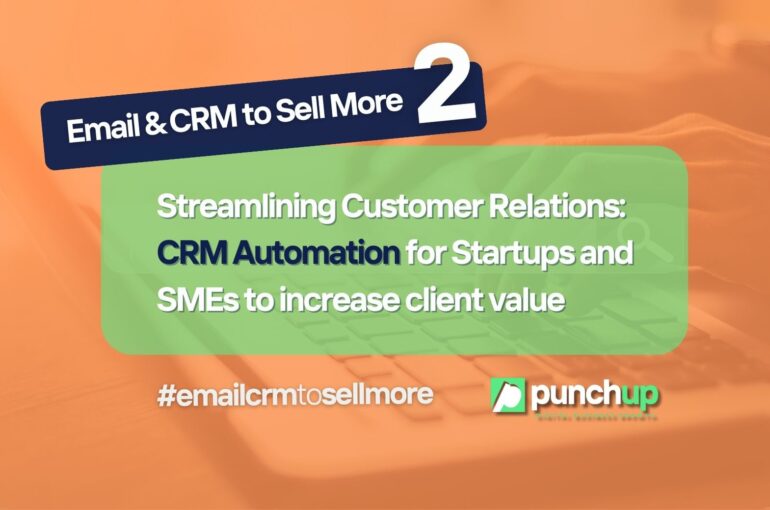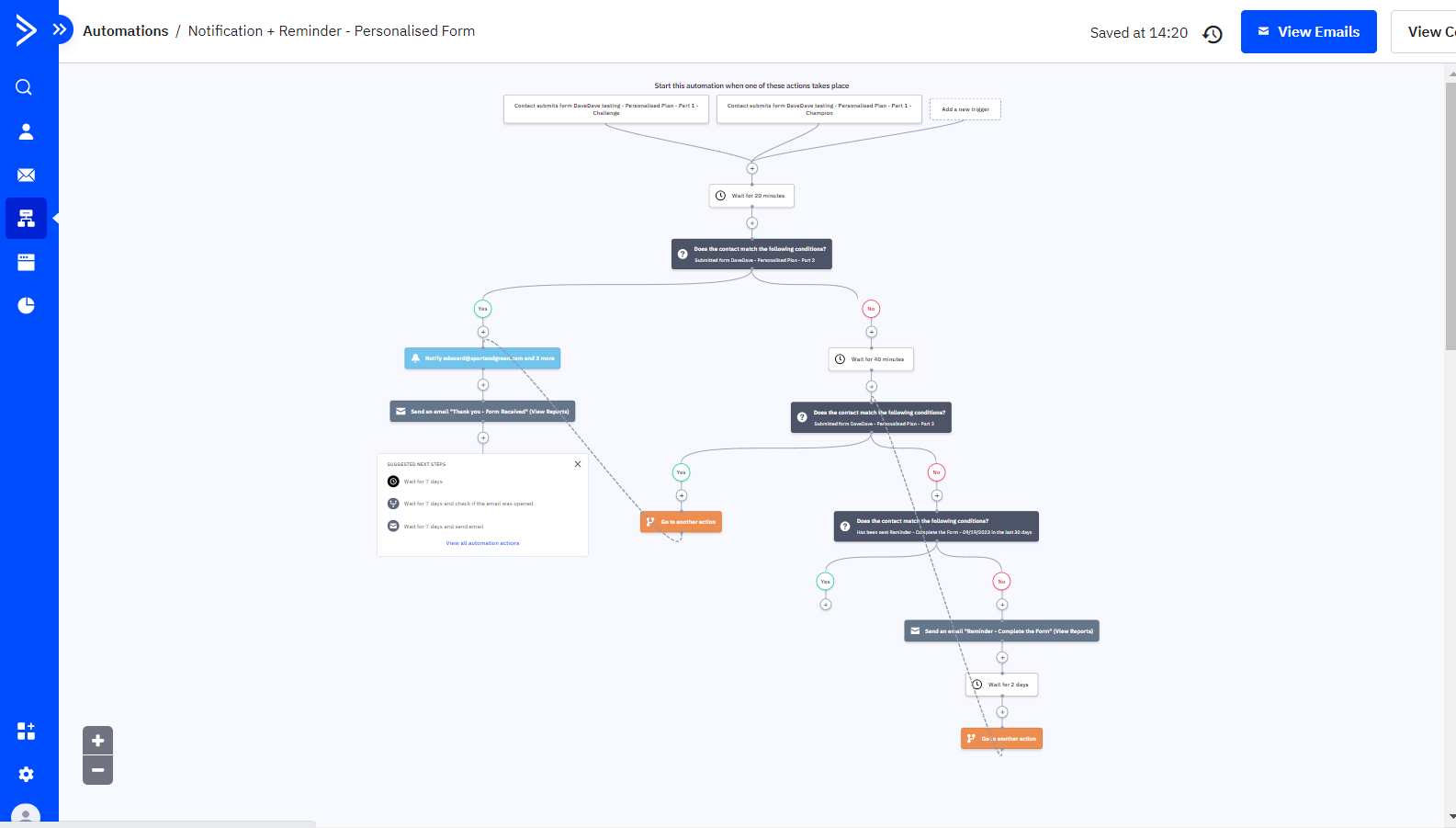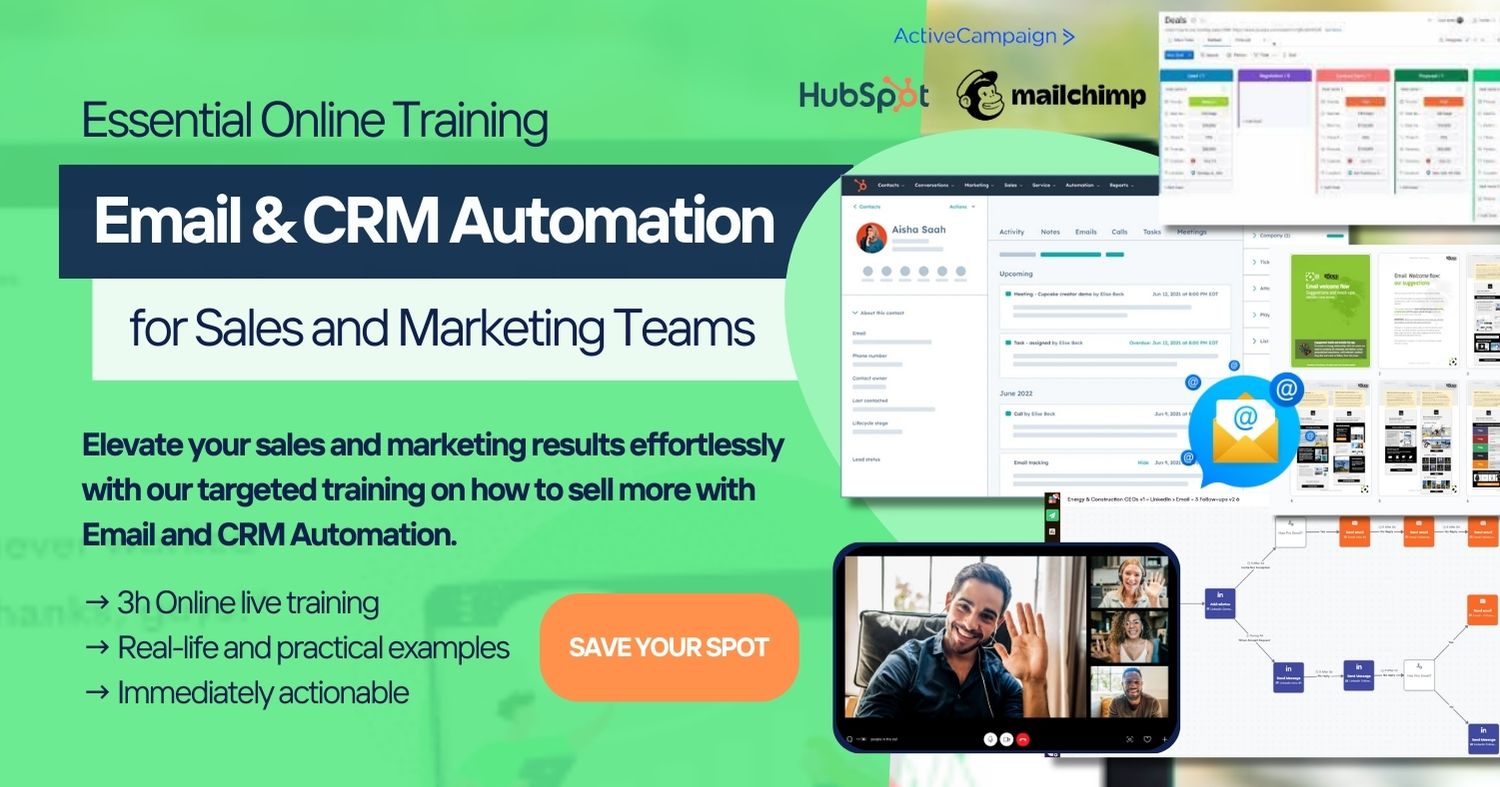[Email & CRM to Sell More #2] Streamlining Customer Relations: CRM Automation for Startups and SMEs
[Email & CRM to Sell More #2] Streamlining Customer Relations: CRM Automation for Startups and SMEs

Welcome to the world of CRM automation, where customer relationships are not just managed but nurtured – it’s like having a superpower for understanding your customers.
CRM automation: It’s like having a personal assistant for each customer, minus the coffee runs.
It’s not just a tool; it’s a strategy for understanding, engaging, and retaining customers with a level of efficiency and personalisation that was once the exclusive domain of larger corporations.
After reading this article, make sure you check our Email & CRM Automation Training for Sales and Marketing Teams. We can guarantee you it will be immediately actionable, as soon as you finish the session.
CRM: Your Business’s Best Friend
In the fast-paced business world, CRM is the loyal companion you didn’t know you needed. As GetResponse reports, welcome emails, a key part of CRM, have an astonishing 63.91% open rate, and that’s just the start of it, the most basic of all steps. Imagine the business growth you can achieve when putting together a thorough CRM system, with several automation and message flows.
(source: https://snov.io/blog/email-marketing-statistics/)

The Imperative of CRM Automation in Modern Business
CRM automation is about transforming data into relationships and interactions into insights. It’s the backbone of a customer-centric approach, crucial for businesses navigating the competitive digital landscape.
-
CRM Automation Explained: At its core, CRM automation involves using software to manage customer interactions, streamline processes, and provide actionable insights – all automatically.
-
Why It’s Essential for SMEs: In the resource-constrained world of SMEs, CRM automation multiplies your capabilities, enabling you to manage a larger customer base effectively and personalize interactions without increasing your workload.
Setting Up CRM Automation: The First Steps
The journey to effective CRM automation begins with understanding your needs and choosing the right tool.
-
Choosing the Right CRM Software: Look for CRM software that fits your business size, industry, and specific needs. Key features might include contact management, sales funnel tracking, marketing automation, and analytics.
-
Data Migration and Integration: Migrate existing customer data into your new CRM. Ensure it integrates seamlessly with other tools you use, like email marketing software or accounting systems.
Mastering CRM Data for Enhanced Customer Experiences
Your CRM is only as powerful as the data it contains. Accurate, comprehensive data forms the basis of meaningful customer interactions.
-
Data Collection and Management: Collect data at every touchpoint – from website visits to sales calls. Regularly clean and update your data to ensure accuracy.
-
Using Data for Customer Insights: Analyze customer data to understand behaviors and preferences. This can guide product development, marketing strategies, and sales approaches.
Automating Key Customer Interaction Points
Automation can transform various aspects of customer interactions, from marketing to post-sale support.
-
Automated Customer Communications: Set up automated emails for different stages of the customer journey – welcome emails, follow-up emails post-purchase, and re-engagement emails for inactive customers.
-
Streamlining Sales Processes: Automate lead scoring and assignment to ensure leads are quickly routed to the right salesperson. Automate follow-up tasks to ensure no opportunity slips through the cracks.
"CRM automation: where every customer feels like they're the only one, and every interaction is a step towards loyalty."
Personalising Customer Experiences with Automation
Personalisation is a key differentiator in customer experience. CRM automation enables you to personalize at scale.
-
Segmentation for Targeted Communication: Use CRM data to segment your customers based on factors like purchase history, location, and engagement level. Tailor your communications to each segment.
-
Behavior-triggered Actions: Set up triggers based on customer behavior. For example, if a customer views a product several times but doesn’t purchase, trigger an email with more information or a limited-time discount for that product.
Integrating CRM with Marketing Automation
Combining CRM with marketing automation creates a powerful synergy, enabling more targeted and effective marketing efforts.
-
Unified Customer View: Ensure your marketing automation and CRM systems share data seamlessly. This unified view allows for more coherent and effective marketing strategies.
-
Data-Driven Marketing Campaigns: Use CRM data to inform your marketing campaigns. Tailor your messaging based on customer segments and previous interactions.
Leveraging CRM for Customer Service Excellence
CRM isn’t just for sales and marketing. It’s a valuable tool for elevating your customer service.
-
Automated Support Ticketing: Use your CRM to automatically create and assign support tickets. This ensures timely responses and efficient issue resolution.
-
Customer Feedback Collection: Automate the process of collecting customer feedback post-interaction. Use this data to continually improve your products and services.
Analytics and Reporting: Measuring Success
To gauge the effectiveness of your CRM automation, delve into analytics and reporting.
-
Key Metrics to Track: Monitor metrics like customer retention rates, average deal size, sales cycle length, and customer satisfaction scores.
-
Data-Driven Decision Making: Use CRM reports to inform business decisions. Understand which products are selling well, which marketing campaigns are effective, and where there are opportunities for improvement.
Real-World Examples and Success Stories
-
Tech Startup Case Study: A SaaS company used CRM automation to nurture leads through personalized email campaigns based on user behavior, resulting in a 30% increase in conversions.
-
Retail SME Example: A small e-commerce store leveraged CRM data to create targeted email campaigns for repeat customers, offering personalized product recommendations and loyalty discounts, leading to a 25% increase in repeat purchase rates.
Staying Ahead: Adapting to Evolving Customer Needs
The digital landscape is constantly evolving, and so are customer expectations. Use your CRM to stay agile and responsive to these changes.
-
Embracing New Technologies: Keep an eye on emerging CRM technologies, such as AI and machine learning, and consider how they can be integrated into your current system.
-
Continuous Learning and Adaptation: Regularly review your CRM strategies and stay informed about best practices. Attend webinars, read industry publications, and consider joining CRM user groups.
Conclusion
CRM automation is not just about managing relationships. It’s about enriching them, one interaction at a time.
It isn’t just about technology; it’s about fostering relationships. It’s like being a good friend, but with better data.
For startups and SMEs, it represents an invaluable asset, enabling them to compete in a crowded marketplace by offering personalized, efficient, and responsive customer experiences. By fully leveraging the capabilities of CRM automation, SMEs can not only streamline their operations but also foster stronger customer loyalty and drive business growth.
If you want to learn how to implement all of this and much more, have a look our unique 2024 training on Email & CRM Automation, to increase the value of your leads and customers.




